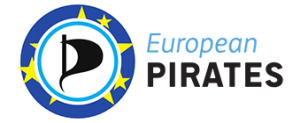Popular pirates excluded from EU debate
 Copied in its entirety from European Pirates
Copied in its entirety from European Pirates
European Pirate Party candidate for the President of the European Commission, Amelia Andersdotter, has been denied participation in a debate with the other candidates. This despite the fact that Amelia, together with Peter Sunde, are the most popular candidates according to the organization VoteWatch’s poll.
Today, April 28, the televised “First European Presidental Debate” is held in Maastricht in front of 700 young voters. The debate is announced as taking place between the nominated candidates to the presidency of the European Commission; however, Amelia Andersdotter, Member of the European Parliament for the Swedish Pirate Party and nominated candidate, has been excluded from participating.
“I don’t like to see myself as a victim. However, the fact that I’m denied access to the first debate between candidates, despite us having followed all the rules for participation and having political support, makes me feel censored for the first time during my time as an EU politician”, says Amelia Andersdotter.
Amelia Andersdotter was nominated for the presidency along with Peter Sunde, former spokesperson for The Pirate Bay, by the European political party European Pirates, which Andersdotter is the chairperson of.
The justification for the exclusion is that she has worked together with the Greens/EFA group in the European Parliament and somebody considered that since one of the candidates who will participate in the debate is from the European Green Party, Andersdotter’s participation would give them two candidates from the same movement. This argumentation has holes, however, as the candidates are nominated by the European political parties, not by the European Parliament political groups.
This decision seems to be taken by the organisers despite the fact that Andersdotter and Sunde’s candidacy has received the highest support by those who have participated in the organisation VoteWatch’s poll.
“I have made my utmost efforts to be represented in each of those debates where European top-level politicians present their visions for the future. There is no reason to block me from these debates just because my political party has been good at cooperating with other political parties in the European Parliament. This is very poor behavior from our competitors. We’re the the youngest party by age of members. Ousting us from a debate targeted at young voters is nonsensical and shows someone is misusing their position”, states Amelia Andersdotter.
Published 2014-04-28 and copied in its entirety from European Pirates
